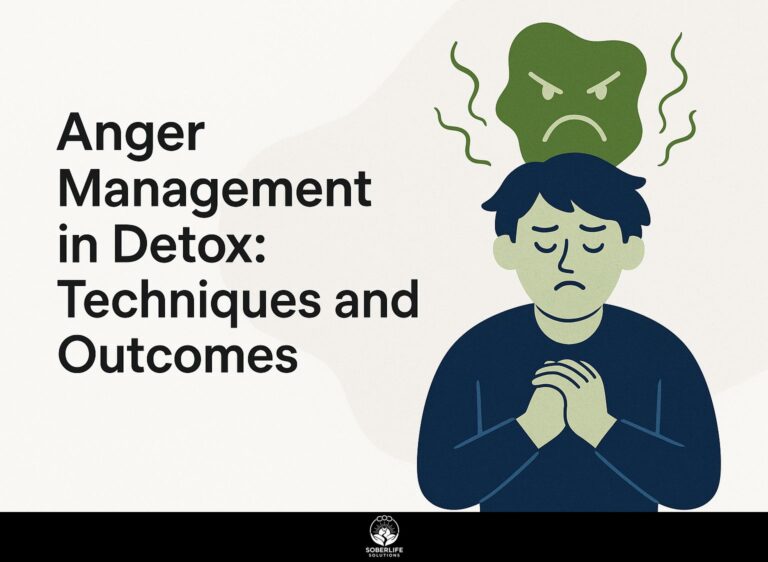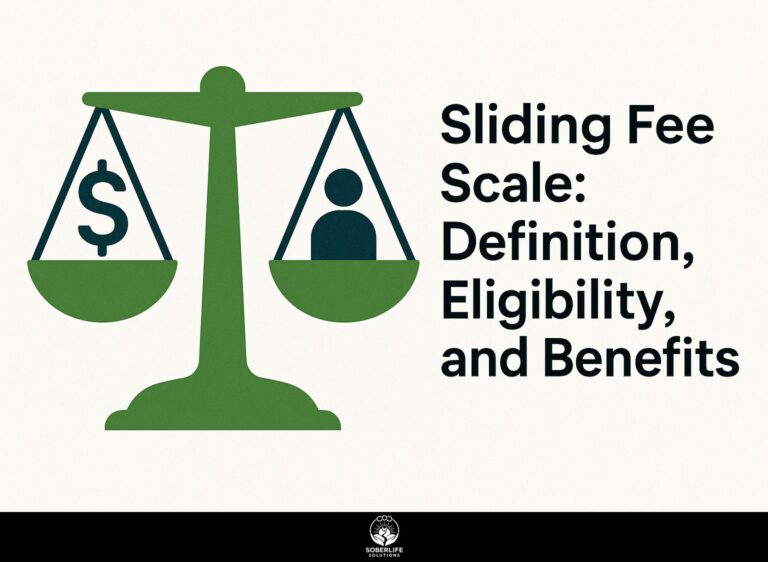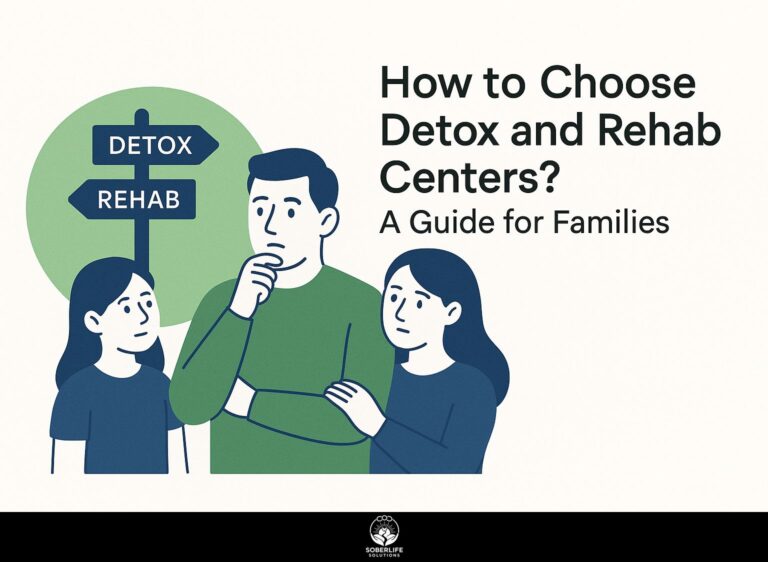Alcohol Detox: Definition, Process, and How It Works
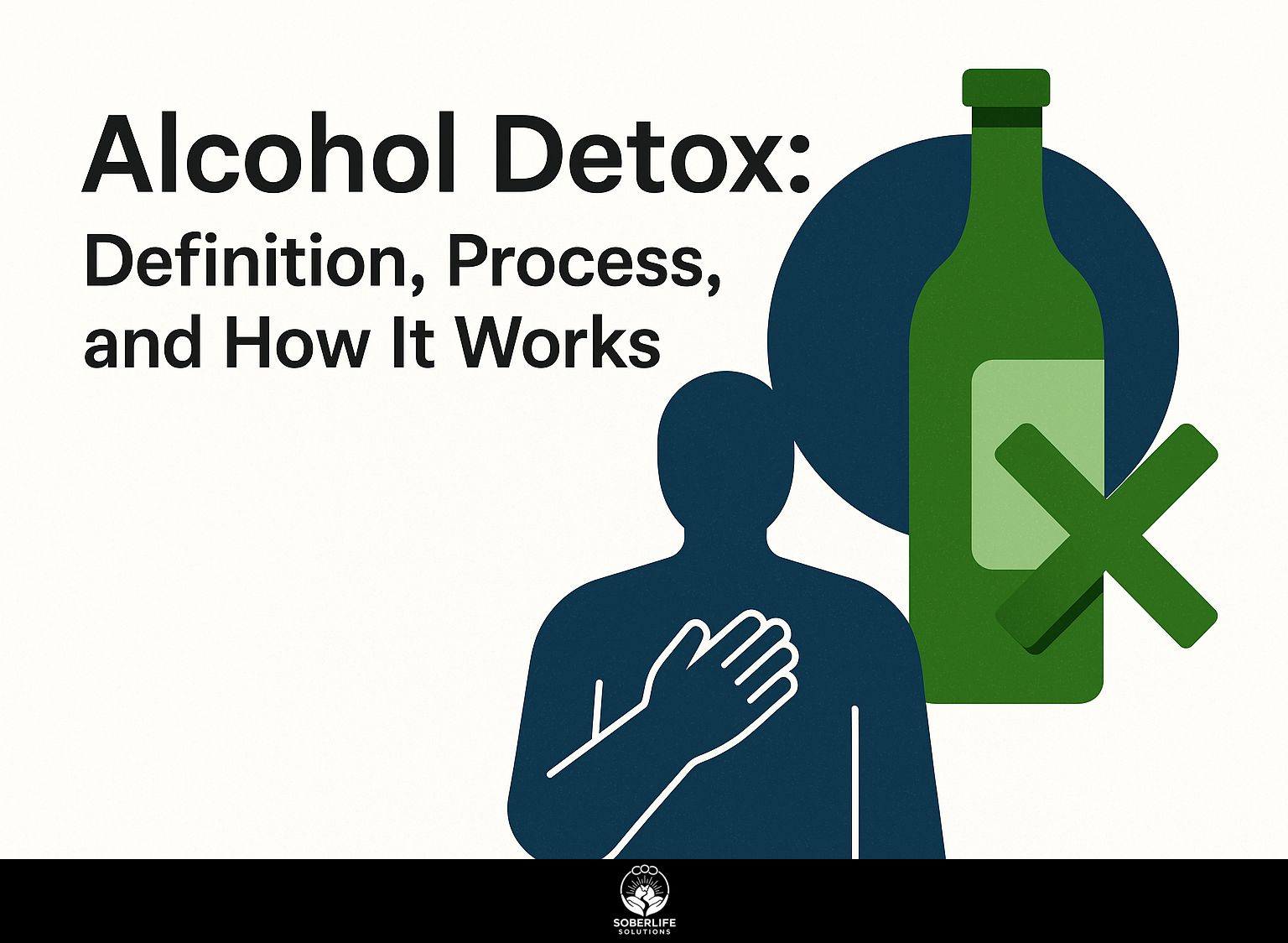
Introduction to Alcohol Detox
Alcohol detoxification is an important step for people dealing with alcohol use disorder, often accompanied by uncomfortable withdrawal symptoms. Knowing the differences between inpatient and outpatient detox programs can help people as they recover. This article examines the detox treatment process, the use of medications like benzodiazepines, and how these methods help provide a safe and successful transition to a healthier life. Learn what to expect and how to handle this important process.
Key Takeaways:
Understanding Alcohol Use Disorder
Alcohol Use Disorder (AUD) affects approximately 14.5 million adults in the U.S., impacting their health, relationships, and overall quality of life.
Signs of AUD can be light or intense, like a powerful need to drink, withdrawal symptoms, and continuing to drink even when it causes difficulties.
Prevalence rates indicate that around 5.8% of adults experience AUD annually. This disorder has serious consequences for both individuals-such as higher chances of liver disease and mental health problems-and society, leading to healthcare costs over $249 billion. According to the CDC, these statistics highlight the extensive impact of alcohol-related issues in the U.S. ( Facts About U.S. Deaths from Excessive Alcohol Use).
Grasping AUD is necessary for making successful prevention and treatment plans. Starting treatment early can greatly improve recovery, and incorporating behavioral therapy approaches can be beneficial in enhancing the effectiveness of these efforts.
Definition of Alcohol Detox
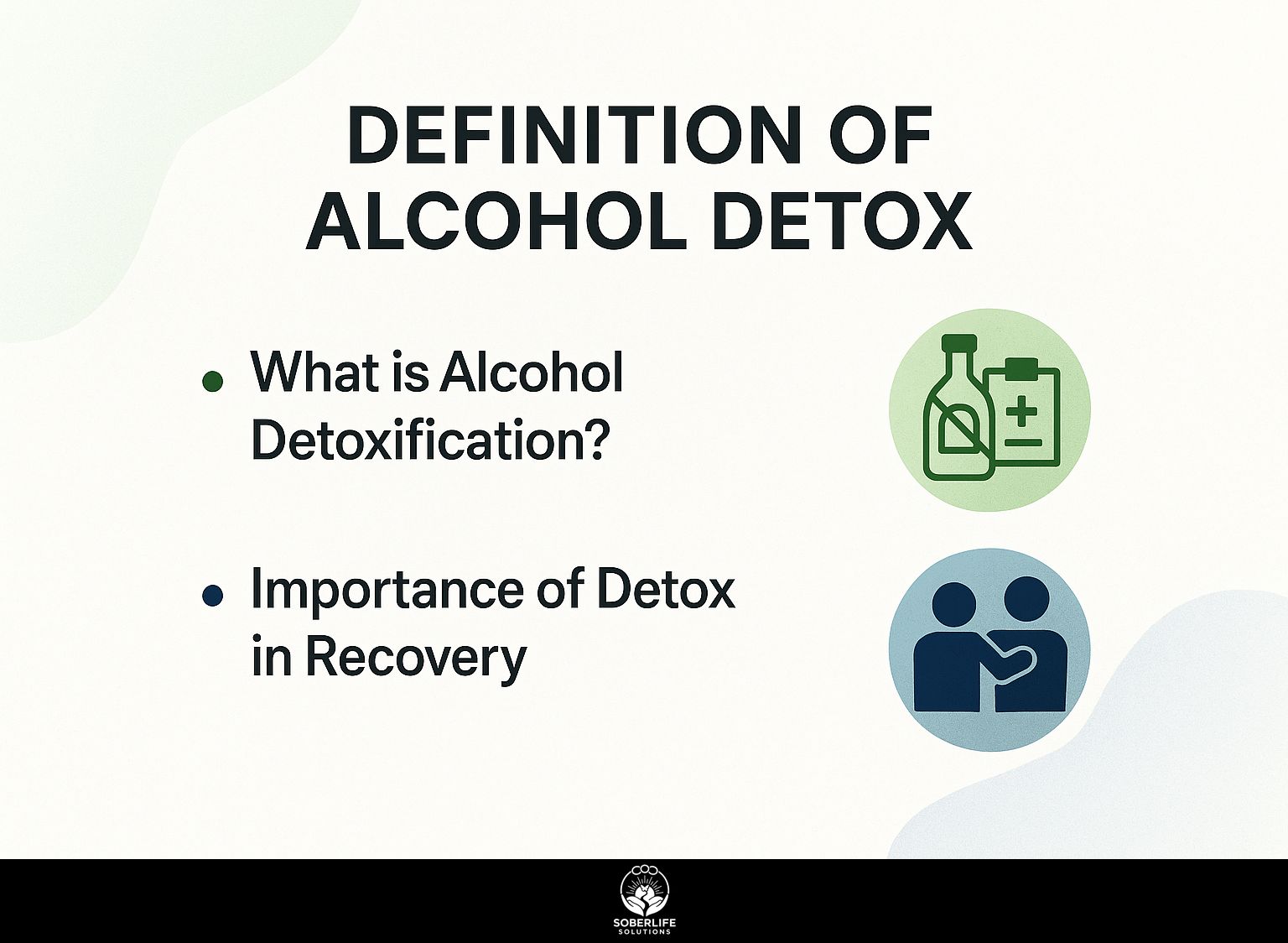
Alcohol detoxification is the process of safely handling withdrawal symptoms when someone cuts down or quits drinking alcohol.
What is Alcohol Detoxification?
Alcohol detoxification usually happens with medical help, ensuring individuals with severe alcohol dependence safely stop using alcohol.
During detox, medical staff might give medications like benzodiazepines to reduce withdrawal symptoms and carefully monitor important health indicators to prevent issues.
Regularly monitoring your pulse, blood pressure, and body temperature helps you stay informed about your health.
Setting up a supportive environment is important; using counseling and group therapy can help people make sense of their experiences and find ways to manage them.
Providing nutritional support aids in physical recovery. Using these complete strategies makes the detox process easier and helps build a base for staying sober over time.
Importance of Detox in Recovery
Good detoxification is important for lasting recovery, greatly lowering the chances of falling back into old habits and improving treatment results.
During detox, individuals undergo withdrawal, which can be physically and psychologically challenging. A detox program led by medical staff keeps patients safe by using medications like buprenorphine or benzodiazepines to handle symptoms.
Including practices like yoga or meditation during this phase can lower anxiety and support emotional balance. Research shows that individuals who engage in a supportive group therapy during detox have higher chances of sustained sobriety.
A carefully planned detox helps prepare someone for successful addiction treatment, building strength and preparing them for recovery.
The Detox Process
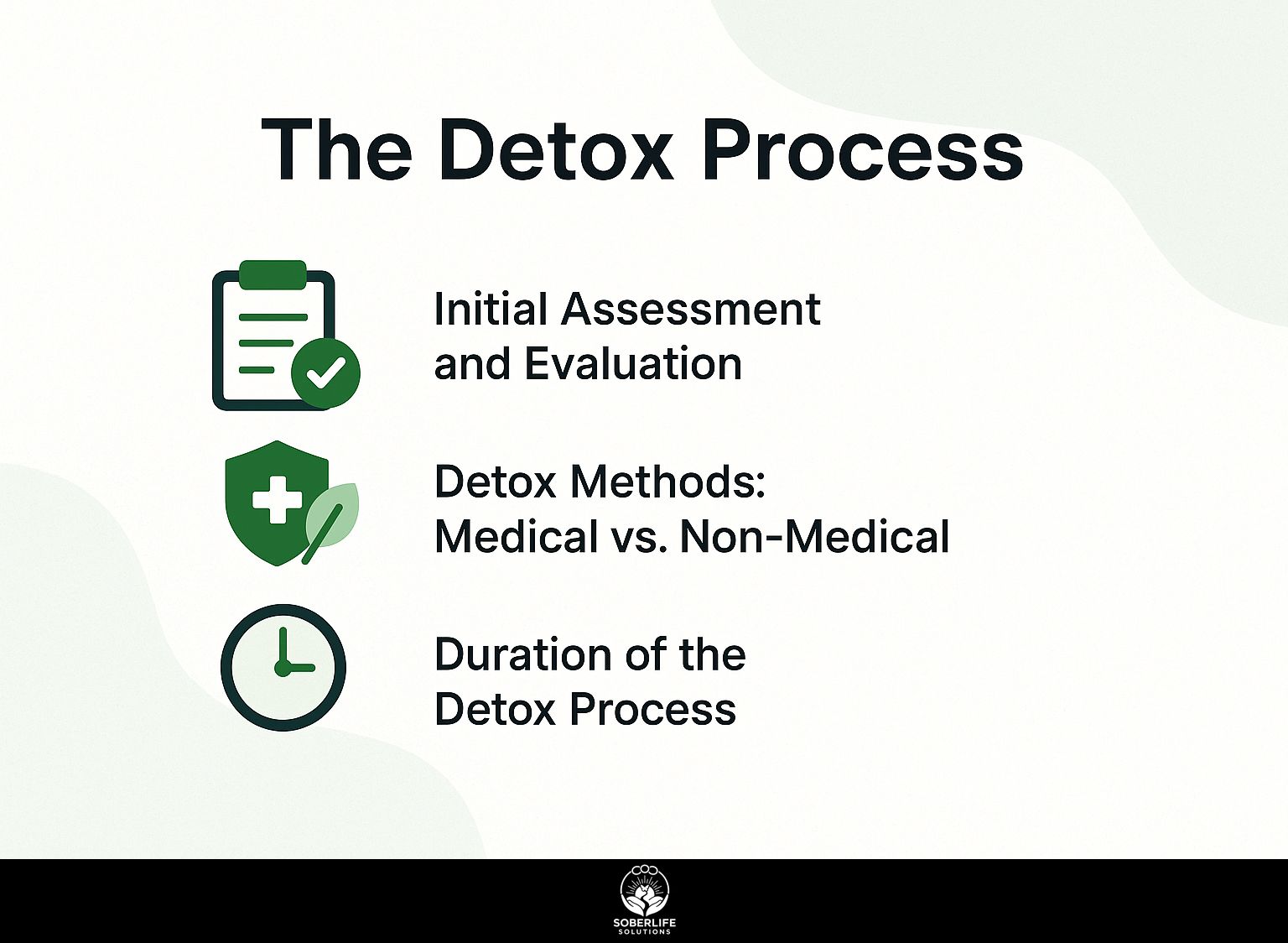
The detox process is an organized activity that varies greatly depending on individual requirements, the intensity of withdrawal, and the methods applied.
Initial Assessment and Evaluation
A first evaluation usually includes a detailed review of medical history, alcohol use habits, and possible withdrawal symptoms.
To correctly evaluate how severe withdrawal symptoms are, the Clinical Institute Withdrawal Assessment for Alcohol (CIWA-Ar) uses a standard method that rates various symptoms. Document findings using the CIWA-Ar scale, focusing on factors like tremors, sweating, and hallucinations. For more detailed information about the CIWA-Ar scale, UpToDate offers a comprehensive overview and calculator.
Assess for comorbid conditions such as anxiety or depression, which can complicate treatment. It’s important to adjust the treatment plan to fit the situation, as dealing with these issues can greatly improve the chances of recovery.
The entire assessment should be completed in a few hours to allow for quick action.
Detox Methods: Medical vs. Non-Medical
Detox methods can broadly be categorized into medical and non-medical approaches, each with its own set of benefits and risks based on individual circumstances.
Medical detox programs typically occur in hospitals or clinics and often use medications like benzodiazepines to manage withdrawal symptoms, making them suitable for people with severe addictions.
In contrast, non-medical detox options include outpatient programs and natural approaches, such as yoga and nutritional therapy, for people with milder addictions. People in calm settings or looking for a more comfortable experience might choose alternatives that don’t involve medication.
In the end, the decision should take into account how serious the addiction is, how comfortable the person is with medical treatments, and the help they can get from others.
Duration of the Detox Process
The duration of the detox process can range from 3 to 14 days, depending on withdrawal symptoms and individual health conditions.
The duration of detox is based on the seriousness of withdrawal symptoms, such as shaking or anxiety, which can extend the process. For example, someone with a history of heavy alcohol use might experience more intense symptoms and require a longer detox period.
Comorbid conditions like depression or chronic pain can complicate recovery, extending the detox timeline. A case study of two people: one person had mild symptoms and completed detox in 5 days. Another person with intense anxiety took 10 days to feel better.
How Alcohol Detox Works
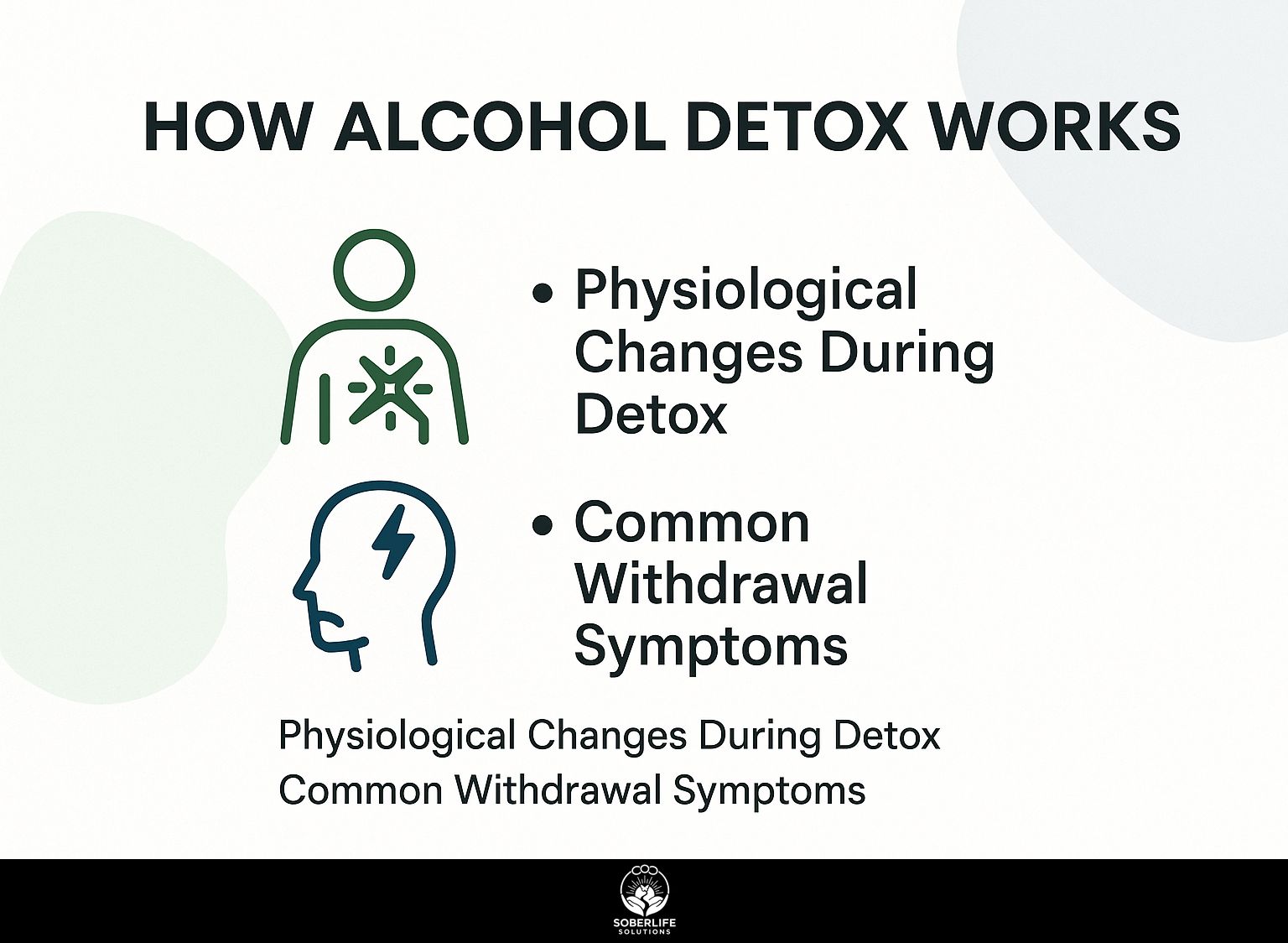
Knowing how alcohol detox works means being aware of the bodily changes and withdrawal symptoms that happen during this important time.
Physiological Changes During Detox
During detox, the body goes through important changes. These include changes in brain chemicals and the chance of serious problems like seizures or severe confusion.
These changes occur as the central nervous system reacts to the absence of substances it has become reliant on. For example, dopamine levels may drop, leading to symptoms of depression and anxiety. MSD Manuals describes how these neurological symptoms are part of the withdrawal process and require careful management. Additionally, understanding how sobriety improves mental health can provide insight into the long-term benefits of overcoming withdrawal symptoms.
Things that can make withdrawal symptoms worse include:
- Prolonged substance abuse
- History of withdrawal seizures
- Co-occurring mental health disorders
Close monitoring and medical support can mitigate risks, often including medications like benzodiazepines to prevent seizures and manage anxiety, which aids the body in recovering more safely during this critical phase.
Common Withdrawal Symptoms
Withdrawal symptoms can vary from feeling a bit anxious to serious issues like hallucinations. Around 10% of detox patients go through delirium tremens.
Symptoms can be grouped by how serious they are:
- Mild symptoms include feeling anxious, sweating, and trouble sleeping;
- Moderate symptoms might include nausea and trembling.
- Severe symptoms can include seizures and hallucinations.
To manage these symptoms, benzodiazepines are often the go-to treatment, as they can safely reduce agitation and prevent complications during detox.
For example, drugs like diazepam (Valium) and lorazepam (Ativan) are frequently administered to stabilize patients. Patients need careful observation in a medical environment to receive proper help during withdrawal.
Aftercare and Support
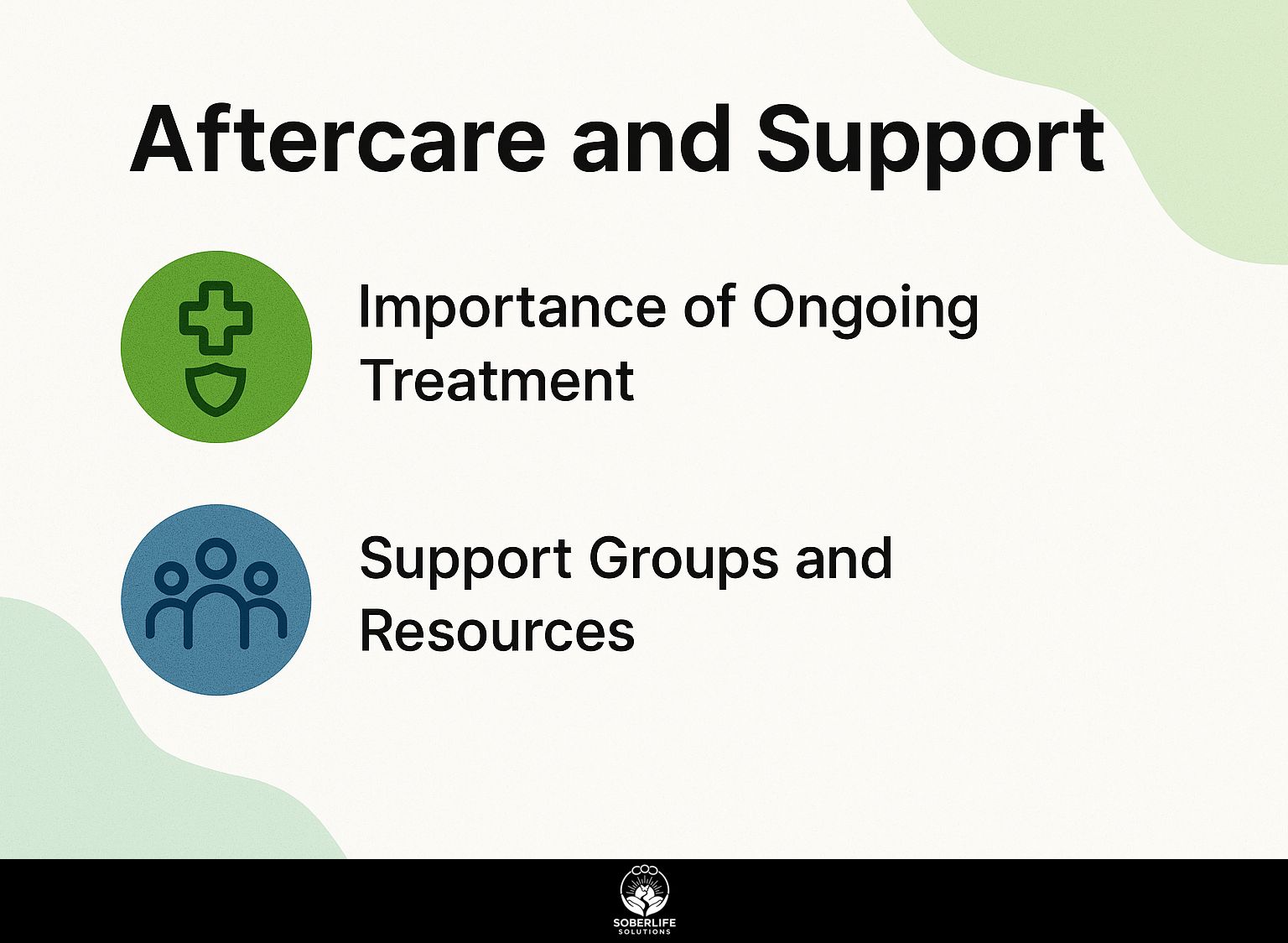
After detox, ongoing support and help are important for staying in recovery and preventing relapse, addressing both mental and physical health needs. For those seeking guidance, understanding how to choose the right detox and rehab centers (our comprehensive guide) is crucial to ensuring a supportive recovery process.
Importance of Ongoing Treatment
Ongoing treatment is critical, with studies indicating that participation in structured aftercare programs can lead to a 50% reduction in relapse rates.
After detox, individuals should consider various pathways to support their recovery.
Outpatient programs offer flexibility, allowing participants to maintain daily routines while receiving therapy.
Counseling, including individual or group sessions, provides emotional support and coping strategies.
Medication treatment can be very important for people with opioid dependency because it helps control cravings and withdrawal symptoms.
Using a mix of these methods often leads to the best results, creating a steady recovery setting.
Support Groups and Resources
Support groups such as Alcoholics Anonymous (AA) provide essential resources and community connection, enhancing the recovery process for many individuals.
Besides AA, you may consider other programs like SMART Recovery, which focuses on controlling your actions and changing habits, or Celebrate Recovery, which uses Christian principles to support recovery.
Local community centers often host meetings, and online platforms like MeetUp can help connect you with groups in your area. Joining these groups encourages responsibility and offers a supportive environment for sharing experiences, greatly decreasing feelings of loneliness.
Use these resources to improve your recovery process and keep long-term relationships.
Frequently Asked Questions
What is alcohol detox?
Alcohol detox is the safe and orderly removal of alcohol from the body to handle withdrawal symptoms and get someone ready for lasting recovery from addiction.
Why is alcohol detox necessary?
Alcohol detox is necessary in order to safely manage the physical and psychological symptoms of withdrawal that occur when a person stops drinking alcohol. Taking the first step to overcome alcohol addiction.
What does the alcohol detox process involve?
The alcohol detox process involves a combination of medical supervision, medication management, and therapy to help individuals safely and comfortably withdraw from alcohol. It also involves making a custom treatment plan for lasting recovery.
How long does alcohol detox take?
The duration of alcohol detox varies depending on the individual’s level of alcohol dependence, overall health, and other factors. In general, it can take anywhere from a few days to a couple of weeks.
What are the symptoms of alcohol detox?
Symptoms of alcohol withdrawal can be mild or serious. Physical symptoms may include feeling sick, headaches, and shaking. Psychological symptoms can involve feeling anxious, being easily annoyed, and trouble sleeping.
How does alcohol detox work?
Alcohol detox works by gradually reducing the amount of alcohol in the body while providing medical and therapeutic support to manage withdrawal symptoms. This allows the body to safely adjust to functioning without alcohol and prepares individuals for ongoing recovery.



